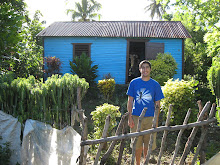
As I have mentioned in the past, one of the projects I have been working on is a water system, or aqueduct, for my village. There was once running water here for some houses, but as the numbers of users increase, us at the end of the line have suffered immensely. Also, when the local government came to “repave” (read: put a few more rocks in the dirt) the road a few years back, they tore up many a pipe. Needless to say, there is not running water anymore. So, last February, I began to work with a local NGO backed by an important public figure who, in my opinion, holds a strong desire to hold office in the future. As of now, he keeps busy by being a powerful force on the provincial level and in his Cabinet office. He also promised to back my project, especially relevant since he has taken an interest in Peace Corps Volunteers and it generally falls under his purview.
Well, 15 months later, we have a hard-earned well and not much else. If you remember, last August while I was in the States, some people from a governmental water agency came to drill the well but as they were to begin drilling the drill fell on a worker’s foot, severing it. They left pretty quickly and I never heard from them again.
In January, I finally got in touch with someone at another governmental water agency. I suppose the other one didn’t want to take up the job (although oddly, the foreman of the team that later showed up was the same man as the one last year). So in March, they showed up almost without warning (they called the night before to suggest that they would come the following day) with an absurdly rusted machine mounted on the back of a truck. Of course, the truck got stuck in a ditch the first night, and we had to call the mayor’s office to bring us another truck to tow it out. It took the team two weeks and two tries to build the 60-foot well. On the first try, the well exploded and caught fire, because of “gas” in the ground. I was suspicious, but I rarely suspend disbelief these days.
Through today, we have had no other progress in receiving a pump to actually use the water, let alone build a holding tank, or put in pipes. I must also stress that I am simplifying the story. Nearly every day for a year, I have made phone calls to these water agencies and the local NGO to get an update on progress or to ask various questions. On the rare occasions I get through to someone, the evasive answers I receive would be comical if not for their inanity. All I can do now is laugh at the situation. Building a well-based water system like this seems like it is done with relative frequency here and without much difficulty - or so I thought. Yet the lack of action (at least in my view) of the key contacts is frustrating. The water agency wanted to charge an outrageous fee to do surveying for the pipes that could only conceivably have been paid by political figure, and my community is caught in the middle. The politicization of the aqueduct has also posed difficulties. I do not want to and cannot be associated with any party or politician, but as I am using government resources and have the backing of the most visible local politician, this has proved almost impossible. Needless to say, it has been an exercise in patience and fortitude, and I have found myself out of shape.
Still, as they did end up building the well itself, I have hope. My neighbors like to say that hope is the last thing that you lose, and though my suspicions run deep, hope remains.
May it stay that way.
I have four months left and continue to be cautiously optimistic about the ability to begin construction on the system by the time I leave. Vamo’ a vei, as they say (“we’ll see” - in a rural Dominican accent).

